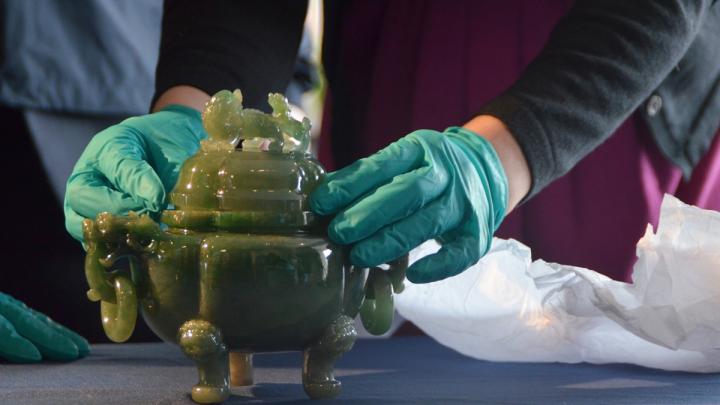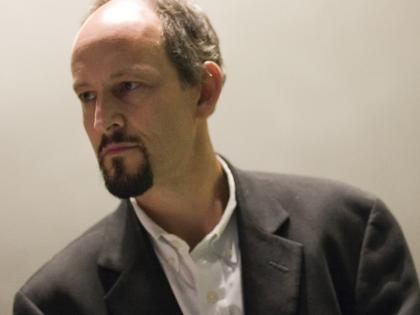After a three-year investigation that played out “like a movie,” according to Homeland Security officials, an eighteenth-century Chinese jadeite tripod covered censer that was stolen from Harvard’s Fogg Art Museum in 1979 has been formally returned to the University. At a ceremony at Hoffman Laboratories today, representatives from U.S. Immigration and Customs Enforcement (ICE) officially transferred the censer back to the Harvard Art Museums, saying they were proud to “right a three-decades-old wrong.”
The artwork disappeared on November 26, 1979, from a small Fogg exhibition featuring a selection of jades. In 2009, it reappeared in Hong Kong, listed for sale by fine-art auctioneer Sotheby’s with a pre-auction estimate of about $500,000. (The censer had been hand-delivered to Sotheby's Hong Kong offices by a private seller, who did not provide any documentation on its history of ownership.) Before the auction, though, Sotheby ran a search in the Art Loss Register database, and found that the censer matched the one missing from the University. The Register in turn notified U.S. law enforcement authorities. Based on recommendations from U.S. Homeland Security Investigations and the U.S. attorney's office in Massachusetts, the Department of Justice granted Harvard's request for the return of the censer this past September, four years after it was recovered. (Businessman and art collector Ernest Dane, A.B. 1892, and his wife donated the Qing Dynasty jade censer, approximately 6½ inches tall and 7 inches wide, to the Fogg in 1942. Censers are typically used for burning incense, but because this particular example is of such high quality, Cabot director of the Harvard Art Museums Thomas Lentz said during the ceremony, it was most likely made for ornamental use.)
Special agent in charge of homeland security in Boston Bruce M. Foucart, whose office led the investigation, acknowledged that the recovery of art is not something typically associated with his department, but said the undertaking represents a growing collaboration between government agencies and the art world. “Federal laws regarding smuggling give us the authority in taking the leading role in investigating crimes involving the illicit importation and exportation of art,” Foucart said. “This piece has been on quite a remarkable journey.”
Lentz praised government officials as well as Sotheby’s for working together to ensure the object’s safe return, calling it an impressive collaboration “among institutions, governments, and the art world.” “These government agencies played an important role in safely returning this significant work of art, which means it can continue to be studied by those interested in art history and culture,” he said. “It allows us to paint a more complete contextual picture of late imperial China. This jade censer, along with thousands of other works in Harvard’s great collection, is an important resource for teaching, learning, and research across all disciplines—not only [at] Harvard, but around the world.”
The censer will rejoin Harvard’s permanent collections just as Harvard Art Museums prepares to open its doors as the newly renovated Fogg, Sackler, and Busch-Reisinger Museums under one roof in the fall of 2014. Lentz said that he expects the censer to be on exhibit within the next few years: “It will finally be accessible once again to students, faculty, scholars, and the public.”








